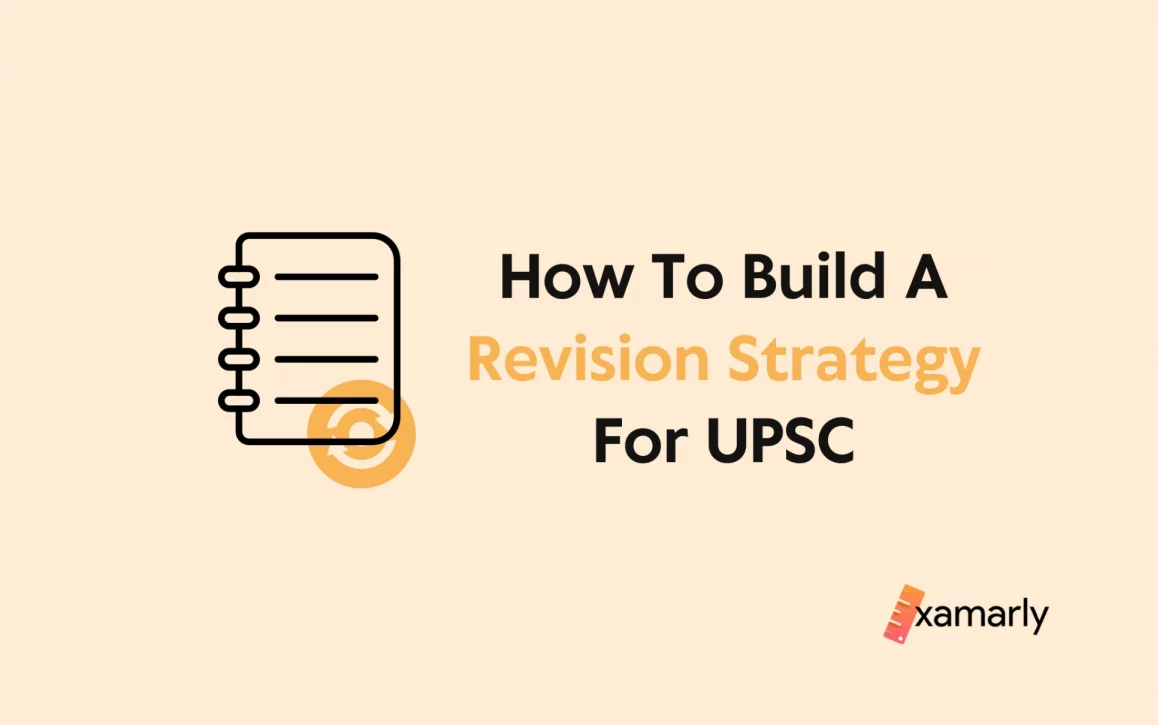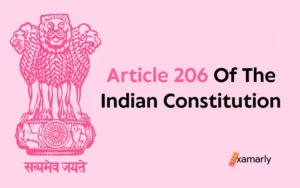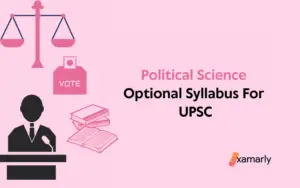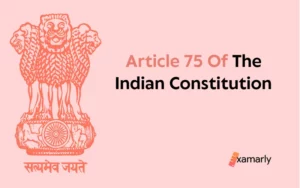Being one of the toughest examinations with an extensive syllabus, a revision strategy for UPSC will help you attain knowledge and recall any information whenever required. This will aid you in interconnecting linked topics so that you can answer the dynamic questions properly.
The holistic revising plan for UPSC Preparation comes in 3 easy steps that are discussed in this article.
- Revision Strategy for UPSC Preparation
- 1. Integrated Revision Schedule
- 2. Revision Strategy After 75% Syllabus Completion
- 3. Last Month Revision Strategy
- 3 Effective Revision Strategies for UPSC
- Revision Strategy for UPSC Prelims and Mains
- Topper's Revision Strategy for UPSC
- Conclusion
- FAQs on Revision Strategy for UPSC
- How much time should I dedicate to revision for the UPSC examination?
- What is the best way to revise for the UPSC examination?
- Should I use textbooks or study notes to revise for the UPSC examination?
- How important is mock testing in the revision strategy for the UPSC examination?
- How often should I revise current affairs for the UPSC examination?
Revision Strategy for UPSC Preparation
The revising strategy for aspirants is divided into 3 phases:
- Integrated revision schedule.
- Revision strategy after 75% syllabus completion.
- Last month revision strategy.
1. Integrated Revision Schedule
Revision carries an equal weightage as your UPSC preparation strategy. Only studying is not helpful unless and until it is equipped with a rigorous revising plan. It shows if the portion you have studied is in your memory or not. It helps you to have a strong grip over the subjects.
How To Do It?
- Undergo revision on a daily basis.
- Keep a minimum of half an hour every day to revise what you have studied the previous day.
- Carve out a maximum of 3 hour time to revise the whole week’s studies on Sundays. It will test how much has been retained by your mind. In short, it boosts memory which will help you to perform well in UPSC Exam.
- Split your revising time into small chunks. It will be useful to identify the efficient way to revise. Including this excellent strategy in your study plan will play a vital role in saving your time.
- Also, solve as many mock papers as you can on weekends to prepare yourself to solve the actual paper with ease. Also, complete the CSAT papers because they are qualifying. Solving mock tests will familiarise you with the type of questions and examination pattern that you will be facing in your actual exam.
Related Article: How Many Mock Tests Before UPSC Prelims.

2. Revision Strategy After 75% Syllabus Completion
Since our minds forget the older chapters/units as we proceed ahead in our studies. This may create a problem if we are unable to balance the old units with the new units. Finishing the entire syllabus is useless if you can’t remember what you studied. For this, follow the revision strategy listed below:
- Divide your study hours into 2 equal halves.
- Keep your first half hours for the new units to be covered and the second half for the revision of previous units.
Now the question that might strike your mind is “where to start your revision?”. The answer is simple. Your revision process starts from important portions then turn to the weaker section and later switches over to the remaining portion of the syllabus.
Commencing your revision with important areas will not only build confidence but also make your grip stronger than before. Solving questions related to these portions will affirm that aspirants are good in this portion and you might not face any issues while solving such questions.
Now about the weaker portion of the Syllabus. Revise it from your notes, mind maps, or take help from a mentor to get well versed in these areas and try to solve the questions related to this section to know whether you are able to solve them or need to work upon more. Then switch over the remaining portion of the UPSC Syllabus to revise effectively.
Note:
You can start your revision from where you want as well. Choose the revision strategy for UPSC IAS exam according to your capability of gaining knowledge.
This way your concise revision will be on track with your UPSC Exam Preparation & you’ll observe the progress up close.
Read Also: How To Stay Motivated For UPSC Preparation.
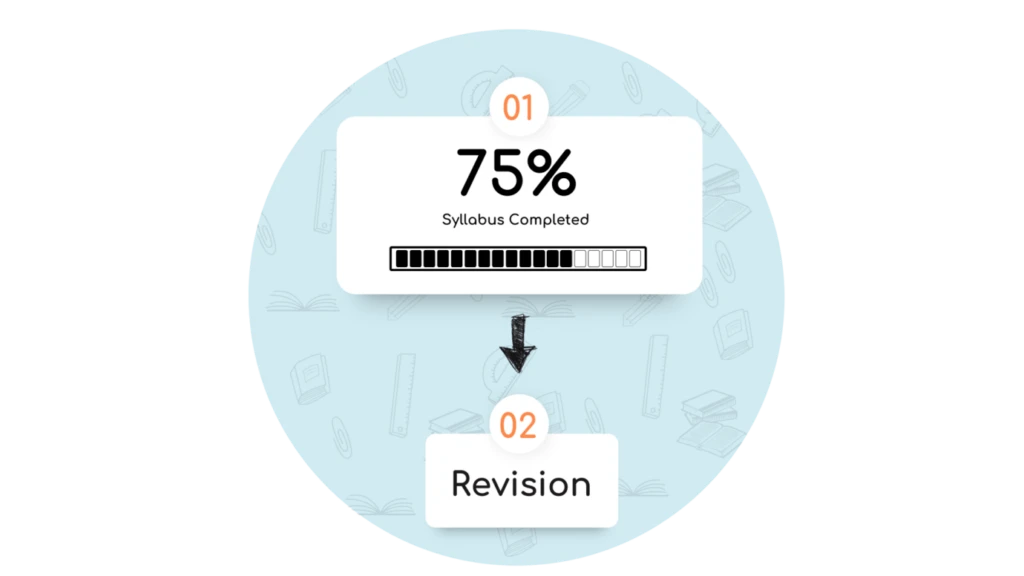
3. Last Month Revision Strategy
Refrain yourself from picking up new topics from the UPSC Syllabus at the last moment, especially for your weak subjects.
Make the most of these 30 days to maximize your efforts for the UPSC Exam. These days are crucial from an exam point of view, hence spend it in revising the UPSC syllabus and solving sample papers or mock tests, previous year question papers, and quizzes of both paper 1 and paper 2 of the UPSC Prelims.
This will assist students in effectively completing the UPSC Prelims paper and increasing your accuracy in selecting the correct option from the four provided alternatives. This last month strategy for UPSC Prelims will supercharge your last-minute preparation.

3 Effective Revision Strategies for UPSC
Every preparation needs some intelligent tools & techniques. These easy-to-follow but great at impact revision techniques will help you with your daily revision schedule & goals.
1. Mnemonics/Acronyms
This is one of the most successful revision strategies. Simple phrases or words are used as mnemonic devices to help people recall complicated ideas. We can use this system to assign one word to another element of a complex equation or something difficult to remember.
Here is an example of a Mnemonic system to memorize Planets of the solar system in order. “Mean Values Elevate Marked Jellyfish Since Umbrellas Nurture Papayas.” The first letter of the names of the planets appears as the first character in each word of this illustrated mnemonic.
Another sort of Mnemonic is the acronym, which is created by allocating the letters of one word to each word of a lengthy sentence that needs to be retained. Similarly, the acronym for the order of planets would become “MVEMJSUNP”.
Also Read: UPSC Preparation Tips From Toppers.
2. Flashcards or Mind Maps
This revision technique holds great power. Small sheets of paper or cards are called flashcards. Each of these cards has a bit of information and a prompt on the opposite side. The prompt side is facing up on the prepared cards. Cards are picked one by one and the person needs to tell the information contained in that card.
This process improves your power to memorize by a huge margin. Mind maps are a sort of brainstorming exercise. Place a topic or name in the middle of the page, then list characteristics of that topic or name to construct a mind map. Then further branch out to revise what you’ve learned.
3. Revision Notes
Revision note-making is somewhat similar to making other notes. The major difference here is that, while your regular notes can be prepared while in a class or while reading a book/topic, revision notes are made out of memory.
When you study something from a book/source, you need to write it down the next day as notes. It will show you how much you retained from your previous study session. Preparing extensive notes in your revision session is one of the most successful revision plan in achieving more than the cut-off.
You might also like to read: Digital vs. Handwritten Notes For UPSC.
Revision Strategy for UPSC Prelims and Mains
1. Revision Strategy for the UPSC Prelims
The Union Public Service Commission (UPSC) Preliminary Examination is a competitive examination and requires a comprehensive and well-planned revision strategy. Here are some tips to help you revise effectively:
- Understand the syllabus: Make sure you have a clear understanding of the UPSC Prelims syllabus and the topics that are covered. This will help you focus your revision efforts on the most important areas.
- Make a study plan: Create a study plan that breaks down the syllabus into smaller, manageable portions. This will help you avoid feeling overwhelmed and ensure that you cover everything in a systematic manner.
- Use study materials: Use a combination of textbooks, study notes, and practice questions to revise each topic. This will help you consolidate your understanding and identify any areas where you need further revision.
- Practice mock tests: Take as many mock tests as possible. This will give you an idea of the type of questions that are asked in the actual examination, and help you improve your time management skills.
- Focus on current affairs: Stay updated with current events and developments in India and the world. This will help you answer the current affairs related questions that are usually a part of the UPSC Prelims. Use the best current affairs magazine for UPSC.
- Revise regularly: It’s important to revise regularly, rather than trying to cram everything into a short period of time before the exam. Make revision a daily habit and try to dedicate at least a few hours every day to studying.
- Get feedback: After taking mock tests, review your answers and get feedback from experienced teachers or peers. This will help you identify your strengths and weaknesses and target your revision efforts accordingly.
By following these tips, you can effectively revise for the UPSC Prelims and increase your chances of success in the examination.
Related Articles:
2. Revision Strategy for the UPSC Mains
The Union Public Service Commission (UPSC) Mains examination is a crucial stage in the selection process for the Indian Civil Services. Here are some tips to help you revise effectively for the Mains examination:
- Review the syllabus: Start by reviewing the syllabus for the Mains examination, paying close attention to the subjects and topics you need to study.
- Make a study plan: Create a study plan that breaks down the syllabus into smaller, manageable portions. This will help you avoid feeling overwhelmed and ensure that you cover everything in a systematic manner.
- Focus on the essentials: Make sure you have a solid understanding of the core concepts and fundamentals in each subject. This will help you answer both factual and analytical questions in the examination.
- Write practice essays: Writing practice essays is a crucial part of preparing for the Mains examination. This will help you develop your writing skills, improve your ability to articulate ideas and arguments, and build your confidence for the examination.
- Practice answer writing: Answer writing is a key aspect of the Mains examination. Practice writing answers to questions from previous years’ papers to get a sense of the format and style of the answers expected in the Mains examination.
- Revise current affairs: Stay updated with current events and developments in India and the world. This will help you answer the current affairs related questions that are usually a part of the Mains examination.
- Focus on quality over quantity: Don’t try to cover too much material in a short period of time. Instead, focus on understanding a few key topics thoroughly and practicing writing answers to questions related to those topics.
- Get feedback: After writing practice answers, review your answers and get feedback from experienced teachers or peers. This will help you identify your strengths and weaknesses and target your revision efforts accordingly.
By following these tips, you can effectively revise for the UPSC Mains examination and increase your chances of success in the examination.
You might also like to read:
Topper’s Revision Strategy for UPSC
Here are a few of the revision strategies used by some successful UPSC toppers:
- Tina Dabi: She followed a strict study schedule and focused on self-study rather than relying on coaching. She also practiced writing answers and took mock tests regularly.
- Athar Aamir Ul Shafi Khan: He prioritized self-discipline and consistency in his revision strategy. He also focused on understanding the concepts thoroughly and practiced writing answers to familiarize himself with the UPSC pattern.
- Anu Kumari: She emphasized the importance of regular revision and took comprehensive notes while studying. She also practiced answering questions and took mock tests regularly to track her progress.
- Ira Singhal: She followed a flexible study schedule and regularly revised the concepts she had learned. She also focused on practicing answer writing and took mock tests to assess her preparation level.
- Roman Saini: He followed a structured study schedule and focused on understanding the concepts thoroughly. He also practiced writing answers to familiarize himself with the UPSC pattern and took mock tests regularly to track his progress.
These are just a few examples, and it’s essential to remember that what works for one person might not work for another. The key is to experiment with different revision strategies and find what works best for you.
Related Article: Famous IAS Officers List.
Conclusion
Whether you like it or not, you need to make a revision strategy for both the UPSC Prelims and the Mains if you are willing to succeed. Your preparation strategy must include regular revision. In this article, we attempted to aid you in developing a holistic revision approach and plan accordingly. You can use all the above-mentioned methods for studying and revising.
For effective preparation and revision, consider Examarly. From quizzes to doubts, preparation of personalised plans, assessing weak areas and many more study resources are available that will help you to ace your UPSC preparation.
FAQs on Revision Strategy for UPSC
How much time should I dedicate to revision for the UPSC examination?
The amount of time you should dedicate to revision for the UPSC examination depends on your individual circumstances, such as the amount of time you have available and your current level of knowledge and preparation. As a general rule, it’s recommended to revise for at least a few hours every day, leading up to the examination.
What is the best way to revise for the UPSC examination?
The best way to revise for the UPSC examination will vary from person to person. Some effective revision strategies include creating a study plan, focusing on the essentials, practicing answer writing, and revising current affairs.
Should I use textbooks or study notes to revise for the UPSC examination?
Both textbooks and study notes can be useful for revision, and the best approach will depend on your individual learning style and preferences. Some people find that textbooks provide a more comprehensive and in-depth understanding of the topics, while others prefer study notes because they are shorter and easier to revise.
How important is mock testing in the revision strategy for the UPSC examination?
Mock testing is an important part of the revision strategy for the UPSC examination, as it helps you become familiar with the format and style of the questions and improves your time management skills. Taking as many mock tests as possible can give you a good idea of the type of questions that are likely to be asked in the actual examination.
How often should I revise current affairs for the UPSC examination?
It’s important to stay updated with current events and developments in India and the world, as this information is likely to be tested in the UPSC examination. It’s recommended to revise current affairs regularly, at least once a week, leading up to the examination.


